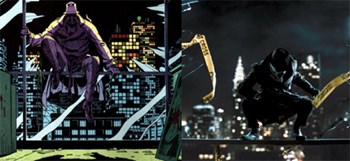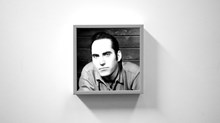
No time to post anything terribly in-depth right now, but a question has been nagging at me, so I thought I'd throw it out there.
There has been a lot of talk lately – a lot – about Zack Snyder's adaptation of the graphic novel Watchmen and the degree to which his movie is an "accurate" or "faithful" rendition of Alan Moore's writing and Dave Gibbons' artwork. Indeed, there has been so much emphasis on the movie's "accuracy" that it struck me as redundant when Warner Brothers released a "motion comic" on DVD that takes the panels of the graphic novel and makes them move. Isn't that more or less what Snyder is doing, except he uses actors etc.?
I have not yet seen the film for myself, but I have read a few reviews, and a line at Roger Ebert's blog (he likes the movie, by the way) puts a fun, witty spin on my concerns: "Faithfulness in adaptation is not necessarily a virtue; this is a movie and not a marriage."
If the discussion has reminded me of anything, it is of the way Christians tend to approach movies based on biblical stories. To quote a line from one of my reviews of The Passion of the Christ: "It is quite telling that the only way many Christians know how to defend a work of art is to assert that it is an 'accurate' adaptation of scripture, as if to minimize its artistry or creativity. It is even more telling that many Christians make this assertion even when the work of art in question contains several elements that are quite definitely not accurate."
I am also reminded of one of the debates swirling around the Harry Potter franchise. Like many other people, I thought the first two films suffered because they tried too hard to follow the books; they squeezed in so much of the plot that they lost sight of the characters. When I first sawHarry Potter and the Philosopher's Stone, I found Chris Columbus's reverence for the text so dull and unexciting that I began to tell my friends that I hoped Peter Jackson would take some liberties with The Fellowship of the Ring, which was still a month away at that time, and make a real movie out of it. (Thankfully, he did.) It wasn't until Alfonso Cuarón's Harry Potter and the Prisoner of Azkaban, which veered from the text in significant ways, that I really got interested in the Harry Potter movies as movies. But I also know people who think that that is one of the worst films in the series, partly because it strayed as much as it did.
Oh, and in the annals of movies that were too reverent towards their source material, we cannot forget Ron Howard's adaptation of The Da Vinci Code. One of the things that made the book so entertaining, heretical though it may have been, was the way Dan Brown threw together every possible cultural reference point that he could think of – from Renaissance art to Disney cartoons – to try to convince the reader that the world is full, full, full of secret meanings just waiting to be decoded. But Howard kept his movie focused on the high-brow stuff, in what seemed like a bid for respectability. And, once again, the movie was really dull.
Anyway. What do you think? How important is "accuracy" or "faithfulness" to a text when making a movie? What movies have been true to the spirit of their source material while veering from the letter of their source material? Has a movie ever been true to the letter but not to the spirit?

Support Our Work
Subscribe to CT for less than $4.25/month


















